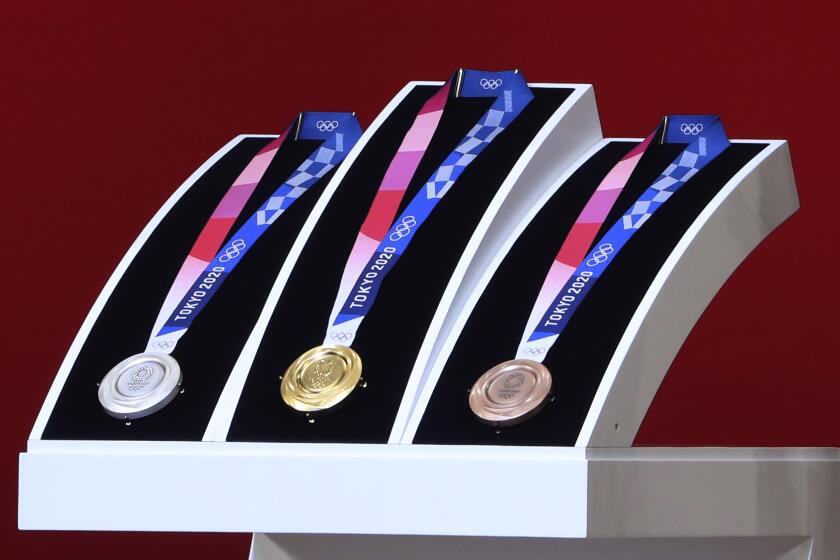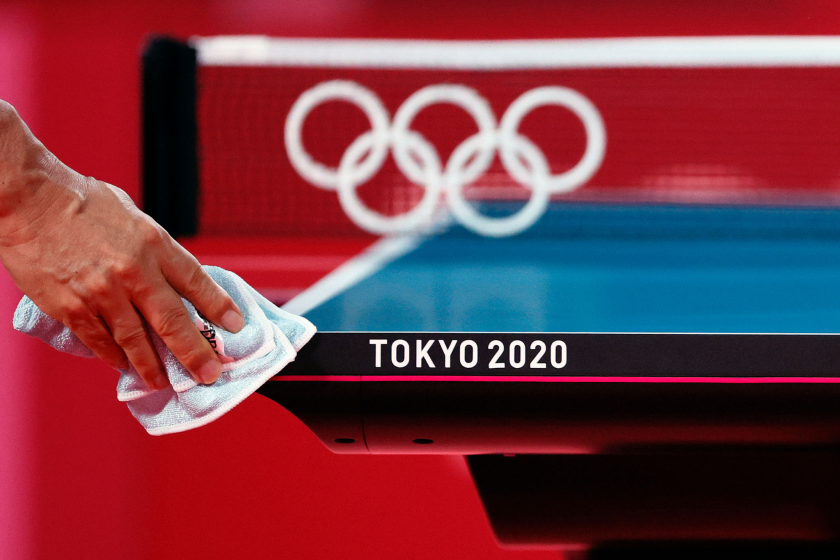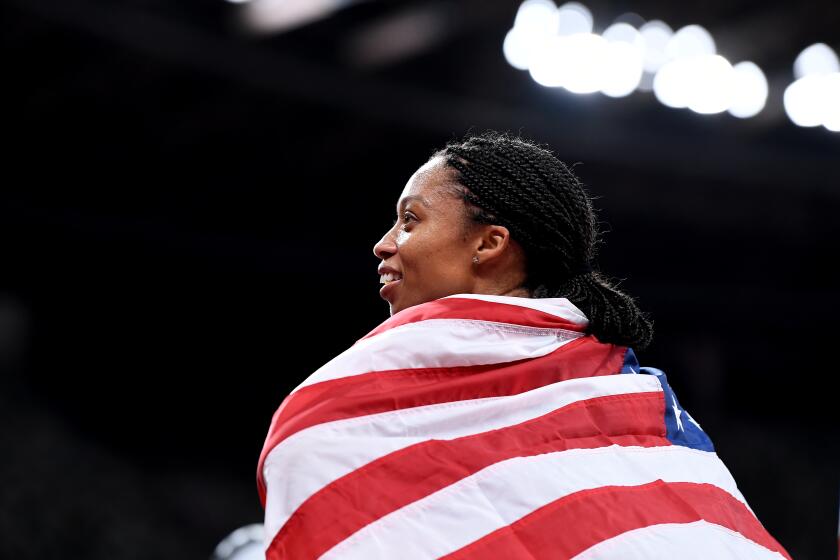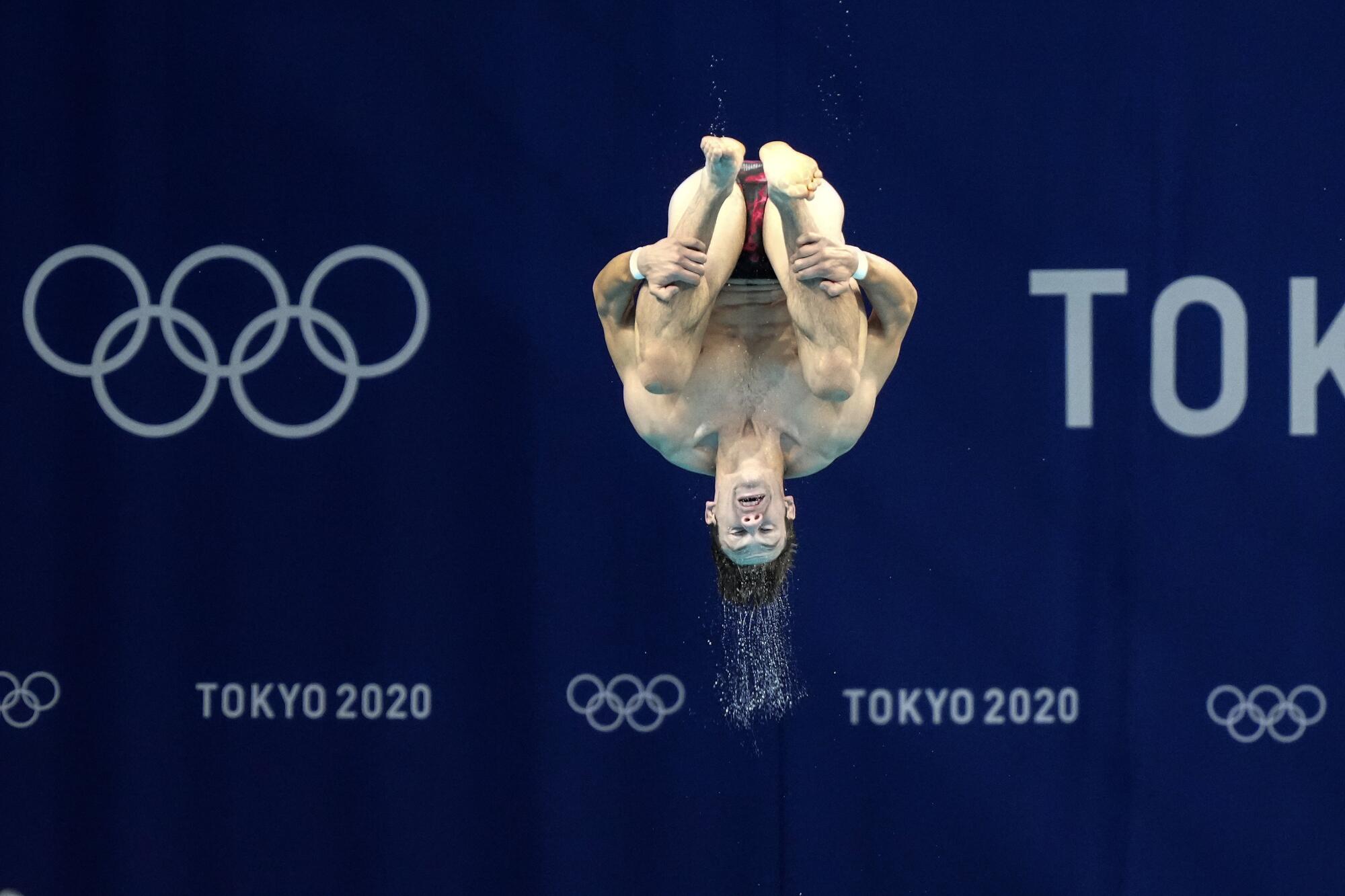
- Share via
TOKYO — No matter how tough the questions get, no matter how many times reporters ask, the person in charge of running the Summer Olympics remains calm. There is a quiet determination in her voice.
The Games are pushing stubbornly ahead despite concerns about surging coronavirus cases in Japan, where only about 20% of residents have been vaccinated. There has been a costly yearlong postponement, a series of scandals and constant public grumbling.
Still, Seiko Hashimoto, president of the Tokyo Olympics organizing committee, shows no sign of wavering at news conferences held inside the modernistic, gold-sheathed Tokyo Big Sight tower.
The United States is the favorite to win the Tokyo Olympics medal count, which would give them top honors for a seventh consecutive Olympic Games.
“We promised the world to host the Games,” Hashimoto tells the assembled media, insisting that “we have to complete our mission.”
The Tokyo Olympics leadership — and the International Olympic Committee — have a reason to remain steadfast. They have a lot riding on the next 17 days.
Billions of dollars in broadcast revenue are at stake, as are political fortunes and a sense of national pride. For good or bad, Tokyo could impact the future of the Olympic movement and, by extension, the 2028 Los Angeles Games.
All of this will play out on a world stage beginning with the opening ceremony Friday evening.
“It’s a kind of psychological and political drama,” says Robert Baade, an economist who studies the Olympics at Lake Forest College in Illinois. “When you study all the outcomes and the dynamics of the relationship between the IOC and Japan, there is so much at play here.”
“Mostly, the important thing is the Japanese image, the national branding. ... I’m afraid the world would not appreciate our efforts.”
— Hirotaka Watanabe, a former diplomat and professor at Tokyo University of Foreign Studies
Most of the attention in recent months has focused on financial ramifications. By various estimates, Japan has spent more than $20 billion preparing for the Games and faces a hefty deficit, needing to recoup as much of those costs as possible. But money is only part of the challenge.
The political consequences for Japanese leaders could be steep, with general elections approaching before year’s end.
The Tokyo Olympics figured to serve as a capstone to former Prime Minister Shinzo Abe’s tenure, but he abruptly stepped down because of illness last year. That put all the pressure on his successor, Yoshihide Suga.
The IOC’s decision to hold the Tokyo Olympics amid an ongoing pandemic in Japan has presented a plethora challenges — and positive tests for athletes before the Games have even begun.
“What would be the implications for a politician who loses the Games on their watch?” Baade asked.
Opinion polls show that much of the Japanese populace favors another postponement or outright cancellation. There have been scandals involving an overpriced design for the centerpiece stadium and, more recently, the resignation of an opening ceremony composer who admitted bullying a disabled classmate in the past.
The 56-year-old Hashimoto, an Olympic cyclist and speed skater in her youth, took over in February when the former president was ousted for making sexist comments about women.
The headlines will get worse if, over the next few weeks, big-name athletes are yanked from competition and events are canceled because of positive coronavirus tests. A continued surge in public infection rates could signal that organizers have failed to deliver on their promise of a “safe and secure” event.
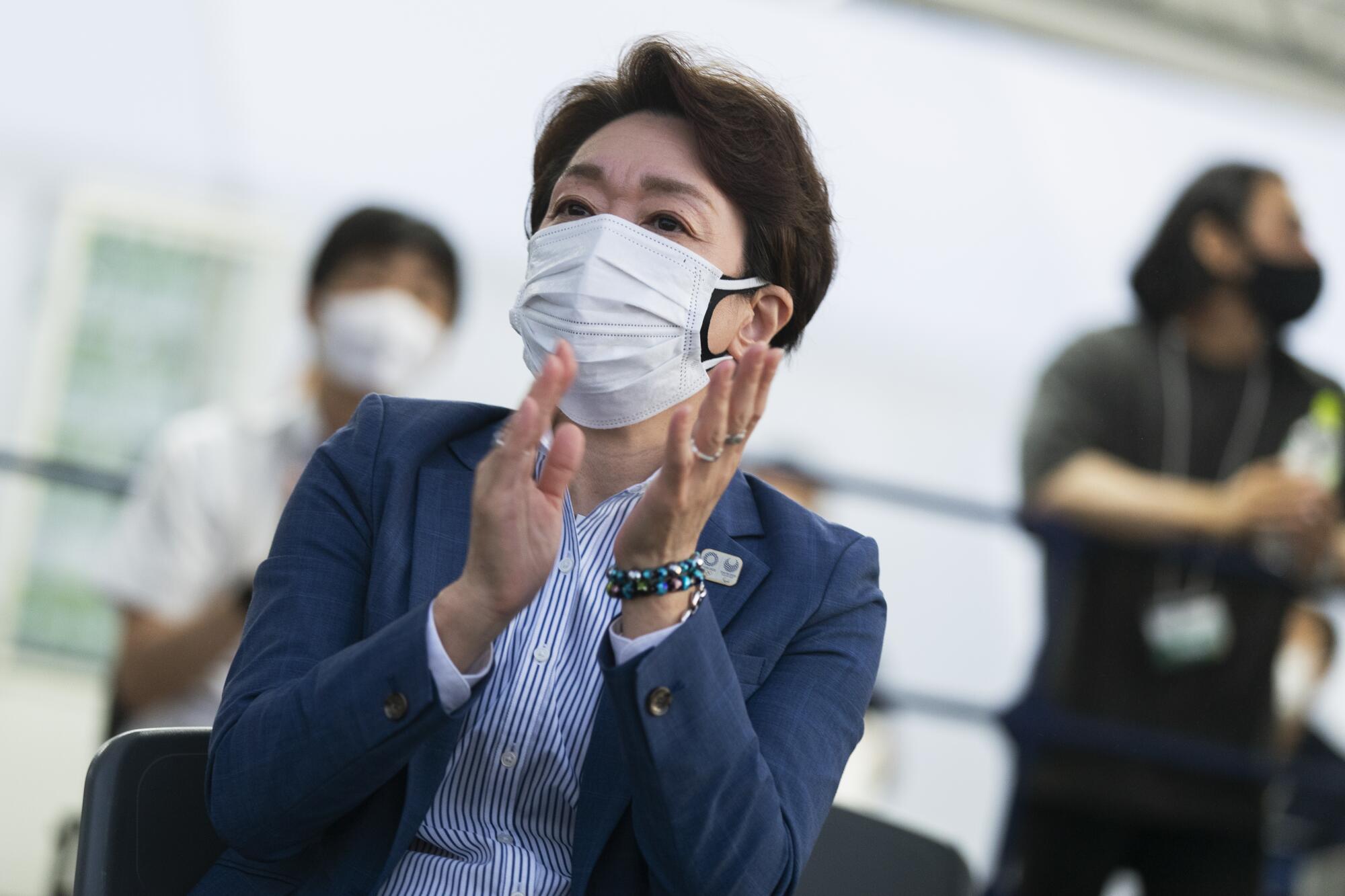
On a global level, Japan originally bid on the Games hoping for a technological showcase and an opportunity to prove it had recovered from the devastating 2011 earthquake and tsunami that caused a nuclear plant meltdown in Fukushima.
“Mostly, the important thing is the Japanese image, the national branding,” says Hirotaka Watanabe, a former diplomat and professor at Tokyo University of Foreign Studies. If the Olympics falter, he says, “I’m afraid the world would not appreciate our efforts.”
Missteps would be further amplified if, next winter, geographical neighbor and sometime rival China pulls off a successful 2022 Winter Games in Beijing.
“It would be a political nightmare,” Baade says.
The IOC faces a similar challenge underscored by Wednesday’s announcement that the 2032 Summer Games have been awarded to Brisbane.
The Australian city was the only candidate under serious consideration. In recent decades, fewer and fewer cities have been willing to gamble on hosting such an expensive event, a predicament that led to the unusual double-award to Paris in 2024 and Los Angeles four years later.
If the COVID-19 pandemic sinks the Tokyo Games, the IOC might start running out of options after 2032. David Carter, a longtime consultant and principal at the Sports Business Group, calls the risk “beyond extraordinary.”
So what does all this mean for the Los Angeles Games? Carter wonders how local organizers might have fared if it had been their turn this summer.
“Los Angeles’ ability to host the Games would have been deeply mired in local and state politics at a time when many residents and taxpayers are questioning the region’s approach to the pandemic,” he said in an email. “This would have been exacerbated by advocacy groups on both sides, to say nothing of the federal government weighing in with its evolving position.”
As an official observer in Japan this week, LA28 Chairman Casey Wasserman believes Southern California is well-suited to adapt to calamity because, unlike most other hosts, it does not need to build an array of stadiums and arenas. Competition in 2028 will be held at existing venues such as the Coliseum, Staples Center and Pauley Pavilion.
“This validates what L.A. has,” he says.
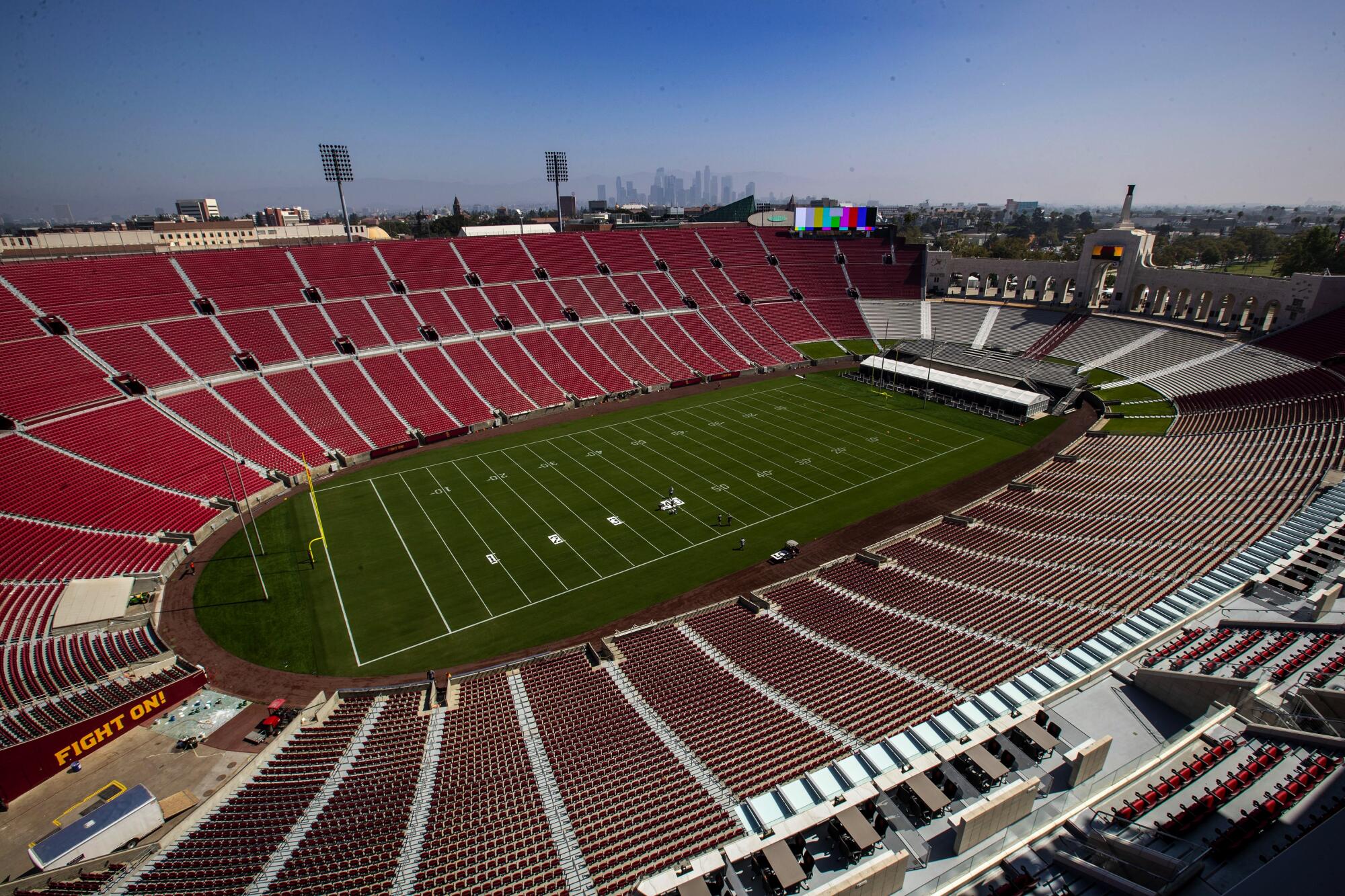
Still, the Tokyo Games might have something to teach future hosts about operating under extraordinary circumstances. Though every organizing committee must plan for the unexpected, Japanese representatives set a new standard by working with health officials and the IOC to develop a “playbook” of safety measures and restrictions designed to allow for safe operation during a pandemic.
Organizers have also trimmed $300 million from their budget by reducing services to an “essential” level. In this way, the coronavirus has perhaps forced the Olympic movement to accelerate its recent efforts to economize when it comes to hosting.
“They’ve had to make things simpler because they have to do so much testing,” says Bill Mallon, a sports historian with the U.S. Olympic & Paralympic Committee in Japan this month. “I suspect some of those things will carry over to the future.”
None of it will matter if Tokyo cannot deliver these Games in reasonably successful fashion. IOC executive John Coates predicted “there will continue to be some teething problems, I’m sure.”
Hashimoto, whose first name comes from the character “sei,” part of the Japanese word for “Olympic flame,” hopes that perseverance will ultimately enhance how people remember her Games. IOC President Thomas Bach, who has overseen a tumultuous decade for his organization, hopes she is right.
“I was also thinking that, at least starting with Tokyo, we’d have a tranquil period,” he told reporters. “So I keep my fingers crossed.”
News, results and features from The Times’ team of 12 reporters who covered the Tokyo Olympic Games in the summer of 2021.
More to Read
Go beyond the scoreboard
Get the latest on L.A.'s teams in the daily Sports Report newsletter.
You may occasionally receive promotional content from the Los Angeles Times.

